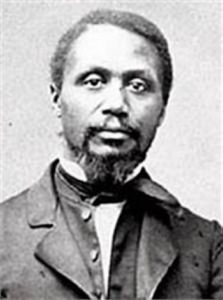
Robert Morris
*Robert Morris was born on this date in 1823. He was a Lawyer, abolitionist, and one of the first Black attorneys in the United States.
Morris was born in Salem, Massachusetts. At the age of 15, Morris went to work as a household servant for the abolitionist lawyer Ellis Gray Loring. When Loring's white copyist neglected his duties. Impressed with Morris's legal understanding, Loring tutored him in the law and in 1847 presented him for admission to the Massachusetts Bar. After his admission to the bar in 1847, Morris became one of the first Black male lawyers to file and win a lawsuit in the United States.
Morris and Macon Bolling Allen opened America's first Black law office in Boston. He was active in Black and abolitionist causes, notably filing and trying the first U.S. civil rights challenge to segregated public schools in the 1848 case of Roberts v. Boston. Morris and Charles Sumner pressed the case, which is believed to be the first legal challenge to the "separate but equal" practice of segregation in America. The Massachusetts Supreme Judicial Court ruled against Morris in 1850. The U.S. Supreme Court later cited the case supporting its Plessy v. Ferguson ruling in 1896, which codified the "separate but equal" standard. "Separate but equal" was ultimately overturned by the high court in Brown v. Board of Education in 1954.
Anthony Burns was a fugitive slave captured and tried under the Fugitive Slave Law of 1850 in Boston. Richard Henry Dana Jr. and Morris acted as Burns' attorneys but were unsuccessful. Shadrach Minkins was a fugitive slave from Norfolk, Virginia, who escaped in 1850 to Boston, Massachusetts, and worked as a waiter. He was captured and held under the Fugitive Slave Law of 1850. Upon arrest at the restaurant where he worked, Minkins was taken to a hearing at the Boston courthouse. Morris worked with attorneys Samuel E. Sewall, Ellis Gray Loring, and Richard Henry Dana Jr. to defend Minkins. Seeking to have Minkins released from custody, they filed a petition for a writ of habeas corpus with the Supreme Judicial Court, which Chief Justice Lemuel Shaw refused.
White and Black members of the anti-slavery Boston Vigilance Committee rescued him. Nine abolitionists were indicted, and charges were dismissed for some individuals. Morris and Lewis Hayden, who had stormed the courtroom to get Minkins, were tried and acquitted. After the passage of the Fugitive Slave Law, clothing retailer John P. Coburn founded a Black militia unit called the Massasoit Guards to police Beacon Hill and protect residents from slave catchers. Morris repeatedly petitioned the Massachusetts legislature on their behalf, but the Massasoit Guards were never officially recognized or supported by the state. The group was a precursor to the 54th Massachusetts Regiment.
Morris, Thomas Dalton, and William Cooper Nell argued the importance of integration in Boston schools: "It is tough to retain self-respect if we see ourselves set apart and avoided as a degraded race by others ... Do not say to our children that however well-behaved their very presence is in a public school, is contamination to your children." Lastly, they said that black schools did not provide the same level of education as the multiple forms of white schools, including primary, grammar, Latin, and high schools. Boston's Black community sought educational opportunities as early as 1787, when Prince Hall petitioned the Massachusetts legislature for equal access to public schools. His attempts to gain access to schools and other institutions were also denied. The Beacon Hill home of Hall's son, Primus Hall, was used as a school starting in 1798. Ten years later, the school was moved to the African Meeting House.
In the 1820s, the city government provided two primary schools for black children. The Boston School Committee did not maintain school conditions and teacher quality, and non-children were excluded from Boston's high school and Latin school. The efforts to create a separate but equal school system in Boston failed. Morris was commissioned as a magistrate of Essex County, Massachusetts, by the governor, making him the second Black lawyer to hold a judicial post. He ran for mayor of Chelsea, Massachusetts, in 1866. Robert Morris died on December 12, 1882.